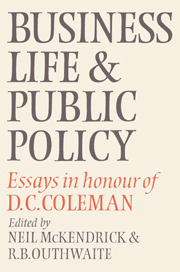Book contents
- Frontmatter
- Contents
- Preface
- List of contributors
- 1 Piscatorial politics in the early Parliaments of Elizabeth I
- 2 Marriage as business: opinions on the rise in aristocratic bridal portions in early modern England
- 3 Age and accumulation in the London business community, 1665–1720
- 4 The use and abuse of credit in eighteenth-century England
- 5 Convicts, commerce and sovereignty: the forces behind the early settlement of Australia
- 6 ‘Gentleman and Players’ revisited: the gentlemanly ideal, the business ideal and the professional ideal in English literary culture
- 7 The City, entrepreneurship and insurance: two pioneers in invisible exports – the Phoenix Fire Office and the Royal of Liverpool, 1800–90
- 8 ‘At the head of all the new professions’: the engineer in Victorian society
- 9 Bernard Shaw, Bertold Brecht and the businessman in literature
- 10 Lost opportunities: British business and businessmen during the First World War
- 11 Ideology or pragmatism? The nationalization of coal, 1916–46
- Bibliography of D. C. Coleman's published works
- Index
Preface
Published online by Cambridge University Press: 07 October 2009
- Frontmatter
- Contents
- Preface
- List of contributors
- 1 Piscatorial politics in the early Parliaments of Elizabeth I
- 2 Marriage as business: opinions on the rise in aristocratic bridal portions in early modern England
- 3 Age and accumulation in the London business community, 1665–1720
- 4 The use and abuse of credit in eighteenth-century England
- 5 Convicts, commerce and sovereignty: the forces behind the early settlement of Australia
- 6 ‘Gentleman and Players’ revisited: the gentlemanly ideal, the business ideal and the professional ideal in English literary culture
- 7 The City, entrepreneurship and insurance: two pioneers in invisible exports – the Phoenix Fire Office and the Royal of Liverpool, 1800–90
- 8 ‘At the head of all the new professions’: the engineer in Victorian society
- 9 Bernard Shaw, Bertold Brecht and the businessman in literature
- 10 Lost opportunities: British business and businessmen during the First World War
- 11 Ideology or pragmatism? The nationalization of coal, 1916–46
- Bibliography of D. C. Coleman's published works
- Index
Summary
This volume of essays, humbly offered by a few of his many pupils, colleagues and friends, celebrates the contribution to historical scholarship of Donald Coleman, a contribution happily still in full flow, despite, or perhaps even because of, his retirement in 1981 from his teaching post as Professor of Economic History in the University of Cambridge. The range and scale of that contribution can be glimpsed from the bibliography of his writings.Its quality is no less remarkable. Essential features of the latter are its incisiveness, its humanity and above all its good sense. In work after work he has brought an acute economic perception to history without ever losing sight of the fact that the past was made by people not processes.These qualities are perhaps most vividly displayed in what is arguably his greatest work, the mammoth three-volume study, Courtaulds: An Economic and Social History (1969–80), where his alchemical touch transformed the all too frequent base metal of business history into an enthralling analytical narrative stretching over two and a half centuries. That great work confirmed his leading position among the world's historians of modern business, rivalling his eminence as an economic historian of the sixteenth and seventeenth centuries.
It is perhaps significant that Donald's working life began in the business world and his academic career rather late. In 1939, at the age of seventeen, he left Haberdashers' Aske's School for the City world of insurance. Two years later he enrolled at the University of London. Hardly had he done so, however, when he was called away by the war.
- Type
- Chapter
- Information
- Business Life and Public PolicyEssays in Honour of D. C. Coleman, pp. vii - xiiiPublisher: Cambridge University PressPrint publication year: 1986



